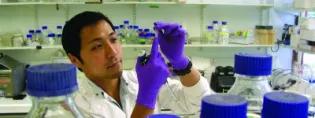Medical training is so packed with all the clinical skills and knowledge you have to learn, that there is little time to learn how to do research.
The programme offers the opportunity to learn robust research skills.
Lectures and workshops
The programme therefore begins with a taught month aiming to give you an overview of the whole range of techniques used in medical research. The first two weeks comprise lectures ranging over subjects from stem cell biology to ethics and clinical trials. You will also get several days of statistics training.

This is followed with two weeks practical workshops in cell biology and molecular medicine. During this, you will be taught practical techniques, including basic tissue culture, how to do PCRs and run Western Blots.
Research project
After the initial taught month, you will move to the laboratory or department relevant to your speciality. The range of research projects carried out is wide, and ranges from bench research to clinical research. You will need to find a supervisor and project before starting the degree.
You can get an idea of the range of research opportunities available at Edinburgh University at Edinburgh Clinical Academic Training (ECAT), or contact the Programme Director for advice.
Research in progress
Around every two weeks, throughout the year, the MVetSci students meet MMedSci students for two hours for ‘research in progress’ meetings.
We also give transferable skills training, during a series of half or one day meetings. Subjects covered include:
- Effective presentations
- Writing up science
- Good Research Practice
Assessment
Individual components of the degree are scored through the year. These are:
- Background reading and project plan
- Oral presentation
- Laboratory book
- Poster presentation
- Final thesis
Each piece of work is marked by two examiners and ratified by an exam board.
As with most professional degrees, this is a degree you either pass or fail, although about 10% of students may get distinctions.
Related Links
This article was published on

